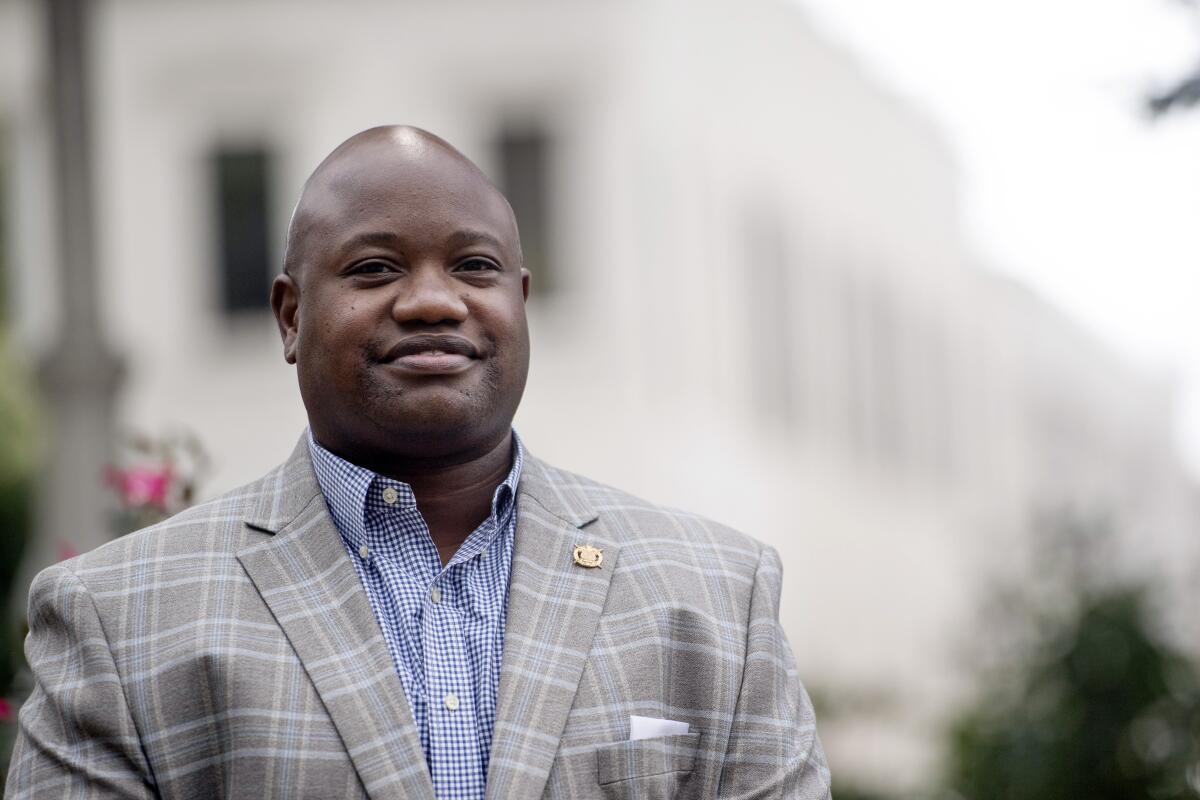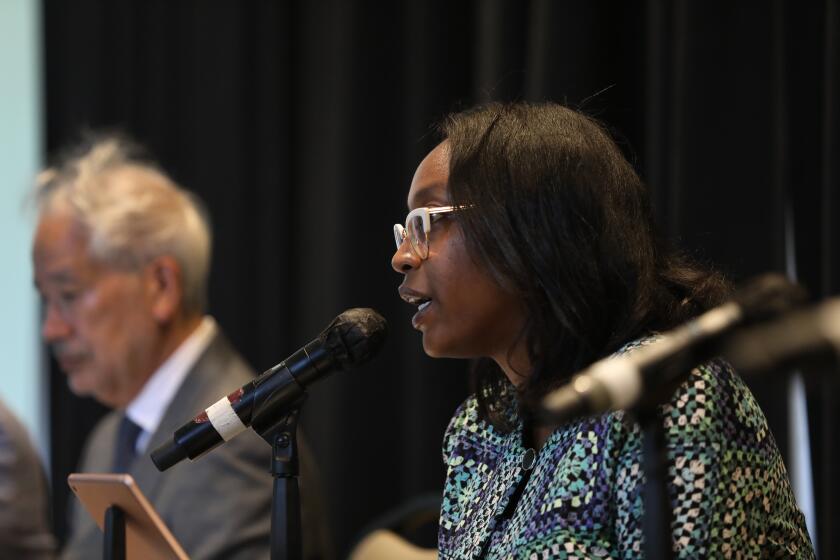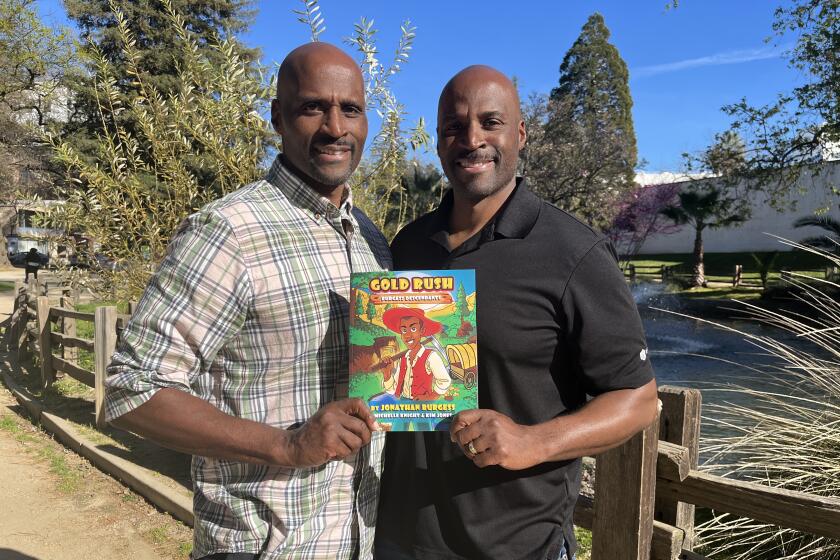Black leaders rebuke Sen. Tommy Tuberville for his stance on reparations and crime

As far as Jeremy Ellis is concerned, Republican Tommy Tuberville should know or learn more about the long history and struggles of the Black residents of Alabama whom he represents in the U.S. Senate.
Tuberville on Saturday told attendees of an election rally in Nevada that Democrats support reparations for the descendants of enslaved people because “they think the people that do the crime are owed that.”
His remarks — seen by many as racist and stereotyping Black Americans as people who commit crimes — cut deeply for some, especially in and around Africatown, a community in Mobile, Ala., founded by descendants of Africans who were illegally smuggled into the U.S. in 1860 aboard a schooner called the Clotilda.
The 2019 discovery of the vessel in the muddy waters near Mobile offers the best argument for reparations of some type to the descendants of the enslaved people who survived the long and arduous Atlantic crossing.
“I think that Sen. Tuberville’s comments were misinformed, ignorant in nature and an embarrassment for the state of Alabama,” said Ellis, who lives in Marietta, Ga., and is president of
the Clotilda Descendants Assn.
Before running for the U.S. Senate, Tuberville spent four decades coaching football, including 11 years as the head coach at Auburn University, about a three-hour drive northeast of Mobile.
Task force begins tackling question of how to structure California’s reparations program for Black residents whose families suffered from slavery.
Ellis graduated in 2003 from Auburn’s engineering school and said he served as a student assistant for the team under Tuberville and went to all the home games.
“I think it would suit Sen. Tuberville to visit Africatown,” Ellis said. “It’s an area he is extremely familiar with since he recruited a number of his players there when he was head football coach.”
Tuberville’s remarks about what he said was the Democratic Party’s response to rising crime across the nation come just weeks before the Nov. 8 midterm elections, as Republicans seek to regain control of Congress.
“They’re not soft on crime,” Tuberville said of Democrats. “They’re pro-crime. They want crime. They want crime because they want to take over what you got. They want to control what you have. They want reparation because they think the people that do the crime are owed that.”
Brothers want California to return land owned by their ancestors. But a task force’s debate over eligibility for reparations is complicating matters.
The first-term senator has not publicly responded to the backlash from his words, which have revived the national debate about reparations.
In April 2021, a House panel approved legislation that would create a commission to study the issue. The White House said earlier that President Biden backs a study into possible reparations for Black Americans.
“When they illegally brought my ancestors to the Mobile, Ala., area, a crime was committed,” Ellis told the Associated Press on Tuesday. “And now that we have the actual artifacts, evidence of the crime, I think this is a clear and perfect case study.”
Tuberville’s statements “are the words of a man who is trying to lead a desperation effort to discredit and discount the fact that reparations are owed,” said Darron Patterson, former president of the Clotilda Descendants Assn. and Ellis’ cousin.
Get our L.A. Times Politics newsletter
The latest news, analysis and insights from our politics team.
You may occasionally receive promotional content from the Los Angeles Times.
Patterson, who lives in Mobile and says his great-great-grandfather was a slave aboard the Clotilda, criticized Tuberville’s assertions.
“Are you saying the descendants of slaves are the only ones doing crime in this country?” Patterson said. “We’ve got people in Washington that really don’t understand what their job is. We sent you there to do the job. The job is to have America’s best interest at heart. How in the world is America’s best interest at heart when you make a statement that Democrats are for crime, and the ones doing the crimes, are the ones hollering for reparations?”
Patterson said he plans to meet with Tuberville next week.
Tuberville’s message was directed at the MAGA Republicans seeking office and supporters of former President Trump, an ally of the senator, according to Ron Daniels, who convened the National African American Reparations Commission.
In 2019, journalist Ben Raines helped find the Clotilda. He discusses his book, “The Last Slave Ship,” and the triumph and tragedy of its descendants.
The remarks present “an Emancipation Proclamation moment” for Biden, a Democrat, to embrace the federal study on reparations and say, “‘I stand on the side of racial justice and racial healing,’” Daniels said.
But Frederick Gooding Jr., an African American studies and honors college professor at Texas Christian University, believes Tuberville was simply “testing the waters.”
“I think this is quite strategic,” Gooding said. “Let’s see where it goes. He’s in a small town in Nevada. We’re a couple years away from the next major national election. He’s leveraging time, pulling some of the rhetoric out piecemeal and in small dosages. Being a successful football coach for so long, strategy literally is his game.”
But what Tuberville said about reparations and crime “doesn’t make any sense,” Gooding added.
In the mid-2000s, attorneys won a pair of legal settlements for $37.5 million in the names of Armenian genocide victims. But families who stepped forward to collect on behalf of ancestors in one settlement had their claims rejected at an astonishing rate of 92%.
“The idea that ‘they want to take over what you got, then control what you have’ stokes fearmongering,” Gooding said. “Then he throws in reparations. Reparations [have] to do with repairing the human crimes that were committed.”
Data compiled by the FBI show that crime has slowed in the last year and that most crimes are committed by white people, who make up more than 75% of the U.S. population, according to the Census Bureau.
The data, which were released Oct. 5, showed that violent and property crime generally remained consistent between 2020 and 2021, with a slight decrease in the violent crime rate overall and a 4.3% rise in the homicide rate.
That’s an improvement over 2020, when the murder rate jumped 29%.
Figures from some of the nation’s largest police departments were not included in the FBI report.
An analysis of crime data by the Brennan Center for Justice also shows that the homicide rate grew nearly 30% in 2020, rising in cities and rural areas alike.
More to Read
Get the L.A. Times Politics newsletter
Deeply reported insights into legislation, politics and policy from Sacramento, Washington and beyond. In your inbox three times per week.
You may occasionally receive promotional content from the Los Angeles Times.














